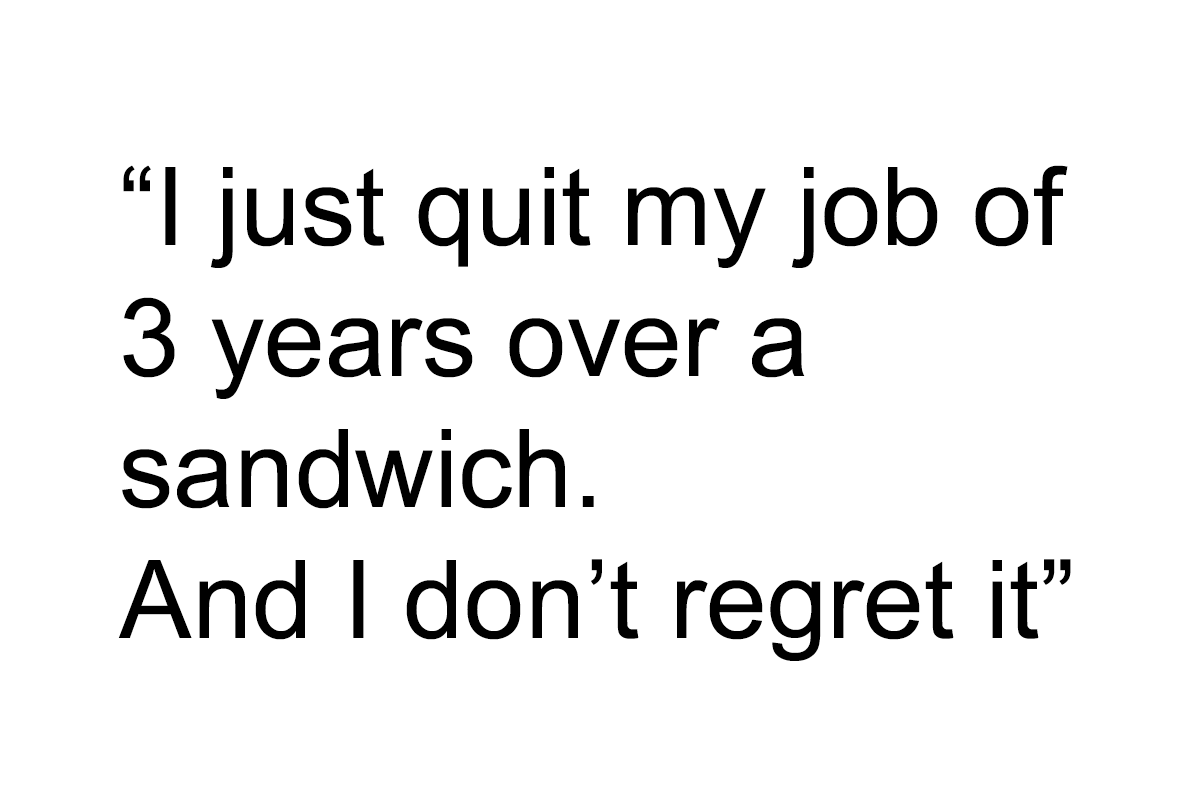
“I Just Quit My Job Of 3 Years Over A Sandwich. And I Don’t Regret It”: Woman Finally Quits After Being Tired, Overworked And Hungry
If there’s one universal truth any employee can relate to, it must be griping away about horrible bosses. As much as we yearn for a solid leader to guide us and let us prosper in the workplace, not everyone is lucky enough to have one. The corporate world is full of patronizing, micromanaging, and toxic managers who regularly go on power trips that benefit no one.
In fact, this is the very reason many employees are handing in their resignation letters. A recent poll by GoodHire found that 82% of American workers said they would potentially quit their job because of a bad manager. Following the pattern, Redditor littlemiss_no from the UK recently walked away from her job of three years… over a sandwich.
Posting her story with the Antiwork community, the woman shared how she has become increasingly disengaged ever since the company forced workers back to the office. Instead of feeling heard by her company, she was welcomed by petty management, arbitrary rules, and zero flexibility. “But what was the straw that broke my back? Half a BLT sandwich,” the user wrote. Read the full story down below, and be sure to let us know what you think of it in the comments.
Recently, one employee shared how she quit her job of three years after the manager freaked out over her eating a sandwich at her desk
Image credits: Alex Green (not the actual photo)
Image credits: Tima Miroshnichenko (not the actual photo)
As it turns out, the problem with littlemiss_no’s workplace runs much deeper than the sandwich. The petty manager, the daunting piles of work, and the never-ending desire to micromanage certainly took a toll and left the woman feeling overworked, unappreciated, and not paid well enough to tolerate the unreasonable rules set by management.
The GoodHire survey mentioned above questioned a total of 3,000 full-time American workers, an equal number from ten of the most popular job sectors, to better understand the relationship dynamics between managers and their employees. They found that most workers feel irritated by a manager who is overbearing, micromanages, and expects them to work outside of working hours. But according to them, “While quitting because of a bad manager is a huge and important decision, oftentimes those decisions are made because of consistent unhappiness at work.”
To learn more about what goes through our minds when we feel a lack of respect from our employer, we reached out to Sunny Patel, a UK-based career-change coach aiming to help professionals find careers that excite them. He told Bored Panda that companies who fail to appreciate their loyal employees for their efforts are slowly driving them away.
“This is one of the reasons why so many successful careers are now built on making moves to new organizations every few years, as opposed to the older model of climbing the ranks,” Patel explained. “After several years in a role and with the development and new skills you’ve acquired, your current employer might still see you as the same person, but a new organization will look at who you are right now.”
This goes in line with the Great Resignation that, as Fortune reports, shows no signs of slowing down. Ever since the start of the pandemic, we witnessed several records of millions of employees voluntarily leaving their organizations in droves in search of better pay, benefits, or recognition.
“This isn’t just a passing trend, or a pandemic-related change to the labor market,” said Bonnie Dowling, a co-author of the McKinsey report that revealed about 40% of workers are considering quitting their current jobs in the next 3-to-6 months. “There’s been a fundamental shift in workers’ mentality, and their willingness to prioritize other things in their life beyond whatever job they hold.”
The woman later joined the discussion in the comments to clarify some details
In these past few years, when working from home was considered the norm, employees got a taste of the benefits of remote jobs. Now, they demand more flexibility, trust, and fulfillment from their work in their professional life. If the employer fails to meet their staff’s needs and leaves them utterly unsatisfied with what they do, workers will simply quit because they know there’s a thriving job market filled with other opportunities.
According to career coach Patel, managers need to put the company incentives in one category and their own efforts in another. “My approach was that if I can motivate and develop a person, as well as ensuring they know that I care, anything the company can offer becomes a bonus. I’ve always felt, and we’re seeing now with the ‘great resignation’, that money is a nice extrinsic motivator, but finding what motivates a person intrinsically is worth far more,” he told us.
“Things such as supporting them to get to the next level in their career, helping them feel that they’re on a career path and not just in a job, as well as getting their buy-in and input to projects before simply asking them to do the work are great ways to keep staff.”
Patel pointed out that while every employee is motivated by different things, we all deserve to feel valued. “This is not indulgent, it is simply human nature. Find what motivates you and fires you up, then work with your boss to see how it might be achievable where you are. If not, start planning your next role and use these things to help you find the right one. I work with people who are seeking their next career move, and step one is always to focus on what doesn’t serve them in their current role and what, specifically, would need to be different in their next one,” he concluded.
Redditors expressed overwhelming support for the user and chimed in with similar stories, here’s what they had to say
729Kviews
Share on FacebookAnd companies wonder why they can't hire anyone: bad reviews, lack of flexibility, poor pay and micromanagement.
@Max Strong: the 12- month maternity leave wasn't something the company did as a kindness. Employees in the UK are entitled to 52 weeks of statutory maternity leave; they had zero choice. The flexibility in this case would be forcing employees to return to the office full-time when wfh has proven to be very successful and increases employee productivity. The problem employers are facing is that employees are no longer willing to tolerate pointless bs at a job.
Load More Replies...This sounds like US level of awful work environments. Sad to see it spreading to other places
Ask for a comprehensive list, in writing, of what's allowed/not allowed. If they want to be picky about what is and isn't a snack then they need to spell it out ahead of time. If they don't give you one then start your own and email it to every employee each time it gets updated.
Item #1: Any food, or food-related, item provided by management as a bribe and a lie to try and convince us they actually give two shits about us. Which they actually don’t.
Load More Replies...I quit a job too, it was paying well but I use to run 12 hours straight on my feet with no breaks. Came home with bleeding feet and hungry as hell. Once I even asked to eat quickly and come back I was told not to have an attitude with her so I said sorry and left. I'm never working there again.
if you keep.the desk clean of crumbs and need to.eat at the desk,why is iit a big deal?
I hope this company goes the way of Sears, KMart, Western Auto and Radio Shack. Wishing you the best in your next job.
They likely will with their attitude! I also hope they do!
Load More Replies...I am 52 and so over being told to have a forced lunchbreak even when I don't need one - fascinating but true; as you get older you need less food/meal times. Just learn to fix the timesheet system to accommodate the swings and roundabouts of real life.
This is good stuff! Made my morning! Workplaces that are toxic should never be tolerated. I had a job one time in which I bawled hysterically and uncontrollably every single day while driving to work. I hated that place so much but was afraid to quit because I had children to feed and rent to pay. No one should ever be made to stay anywhere that is sucking the life out of them. I hope she finished eating her sandwich!!!
You go girl. Tolerating narcissistic abuse should never be part of a job.
I once had a manager that forbade me from eating at my desk even though the company allowed it (as long as you didn't munch into the phone if you were on a call with a client) because she decided that i was too awkward (I'm Neurodivergent) and i needed a push to make friends so she wanted to force me into the break room. I ate in my car instead. Btw. I did/do have friends. My coworkers are not friends tho. They're coworkers.
This is a bit suss. The UK has very well established sick leave laws (including pay) so to say the company's sick pay policy is 'diabolical' makes me question the whole story.
I worked for a company recently whose policy was that you didn’t get company sick pay for the first 6 months of employment. In the UK if you are sick there are 3 “waiting days” before you can claim SSP (statutory sick pay of £99.35 per week), and these have to be 3 days which you would normally work. Most of their staff are shop workers and their rotas all seem to be arranged as 2 or 3 days a week. So for instance, if they only work Monday and Tuesday every week, they would have to be sick for over a week before they get any SSP, and wouldn’t get company sick pay. This still applies even if the employee has Covid, the company didn’t make any allowances at all even during the height of the pandemic. So most of them choose to take any sick leave as annual leave so they will still get paid. Maybe not a “diabolical” policy, but to me it felt mean-spirited and penny-pinching - but perfectly legal..
Load More Replies...I would be ordering a full lunch delivered to my desk every day during my notice.
Instead of saying "a sandwich," should have answered back "a snack" when asked. See how they respond. I'm curious at least.
I would have cut the sandwich at the small parts and call it a snack
The hell!? What company forbids eating lunch at your desk? I do it all the time! It saves me time from having to spend at work. I can eat and still do my work. 🤦♀️ I'm so glad the company I work for is not this petty and up tight.
I worked for a staffing company that allowed it when I began working there but then decided to micromanage us and installed cameras and informed us that we weren't allowed to eat at our desk anymore. I mean, we couldn't close down the office in order to have a lunch break somewhere else. So they told us we'd have to take a lunch break and close down the office.. Except that we'd be in trouble if anyone called while we were out or if we stopped an urgent assignment (finding workers to do temp labor jobs for our clients) in order to take a break. In the 2 years I was there, I'd only seen actual clients in the office twice and once was when a client was offering to take the office staff to lunch.
Load More Replies...SHE SHOULD KNOCK THIS MOTHERFUC KER OUT IN THE PARKING LOT AFTER WORK THEN TIE HIS UNCONSCIOUS MEAT BAG TO THE REAR BUMPER OF HER CAR THEN TAKE A LONG AND BRISK TOUR OF THE CITY'S WORST ROADS. WHEN ALL HIS LIMBS AND MOST OF THE FLESH HAS FALLEN OFF TAKE THAT HALF A SANDWICH AND STICK IT UP HIS BUT THOLE! BUT THOLE! BUT THOLE! BUT THOLE! BUT THOLE! BUT THOLE! BUT THOLE! BUT THOLE! BUT THOLE! BUT THOLE! BUT THOLE! BUT THOLE! BUT THOLE! BUT THOLE! BUT THOLE! BUT THOLE! BUT THOLE! BUT THOLE! BUT THOLE! BUT THOLE! BUT THOLE! BUT THOLE! BUT THOLE! BUT THOLE! BUT THOLE! BUT THOLE! BUT THOLE! BUT THOLE! BUT THOLE! BUT THOLE! BUT THOLE! BUT THOLE! BUT THOLE! BUT THOLE! BUT THOLE! BUT THOLE! BUT THOLE! BUT THOLE! BUT THOLE! BUT THOLE! BUT THOLE! BUT THOLE! BUT THOLE! BUT THOLE! BUT THOLE! BUT THOLE! BUT THOLE! BUT THOLE! BUT THOLE! BUT THOLE! BUT THOLE! BUT THOLE! BUT THOLE! BUT THOLE! BUT THOLE! BUT THOLE! BUT THOLE! BUT THOLE! BUT THOLE! BUT THOLE!
There is a good reason, why UK is called the USA-of-Europe. Many things in UK, are illegal in EU.
Well, UK is one of the trees to our (usa) apple.
Load More Replies...Working from home was a one time covid thing. That’s over with so now you have to go back to the office and I’m fine with that. A ton of companies don’t allow you to graze while on the clock. If you know the rules but decided against it because it seems you were already pissed off just having to come back to the office. Just admit that and I’d just chalk it down to you just didn’t like your manager. Great. Move on
Don't tell me, lemme guess...you're an ignorant arrogant micro manager...
Load More Replies...Wow, Max, maybe you should read the article just a wee bit more before you are so judgemental. It may just help you get off your pedestal and walk along the mortals a bit easier.
Load More Replies...And companies wonder why they can't hire anyone: bad reviews, lack of flexibility, poor pay and micromanagement.
@Max Strong: the 12- month maternity leave wasn't something the company did as a kindness. Employees in the UK are entitled to 52 weeks of statutory maternity leave; they had zero choice. The flexibility in this case would be forcing employees to return to the office full-time when wfh has proven to be very successful and increases employee productivity. The problem employers are facing is that employees are no longer willing to tolerate pointless bs at a job.
Load More Replies...This sounds like US level of awful work environments. Sad to see it spreading to other places
Ask for a comprehensive list, in writing, of what's allowed/not allowed. If they want to be picky about what is and isn't a snack then they need to spell it out ahead of time. If they don't give you one then start your own and email it to every employee each time it gets updated.
Item #1: Any food, or food-related, item provided by management as a bribe and a lie to try and convince us they actually give two shits about us. Which they actually don’t.
Load More Replies...I quit a job too, it was paying well but I use to run 12 hours straight on my feet with no breaks. Came home with bleeding feet and hungry as hell. Once I even asked to eat quickly and come back I was told not to have an attitude with her so I said sorry and left. I'm never working there again.
if you keep.the desk clean of crumbs and need to.eat at the desk,why is iit a big deal?
I hope this company goes the way of Sears, KMart, Western Auto and Radio Shack. Wishing you the best in your next job.
They likely will with their attitude! I also hope they do!
Load More Replies...I am 52 and so over being told to have a forced lunchbreak even when I don't need one - fascinating but true; as you get older you need less food/meal times. Just learn to fix the timesheet system to accommodate the swings and roundabouts of real life.
This is good stuff! Made my morning! Workplaces that are toxic should never be tolerated. I had a job one time in which I bawled hysterically and uncontrollably every single day while driving to work. I hated that place so much but was afraid to quit because I had children to feed and rent to pay. No one should ever be made to stay anywhere that is sucking the life out of them. I hope she finished eating her sandwich!!!
You go girl. Tolerating narcissistic abuse should never be part of a job.
I once had a manager that forbade me from eating at my desk even though the company allowed it (as long as you didn't munch into the phone if you were on a call with a client) because she decided that i was too awkward (I'm Neurodivergent) and i needed a push to make friends so she wanted to force me into the break room. I ate in my car instead. Btw. I did/do have friends. My coworkers are not friends tho. They're coworkers.
This is a bit suss. The UK has very well established sick leave laws (including pay) so to say the company's sick pay policy is 'diabolical' makes me question the whole story.
I worked for a company recently whose policy was that you didn’t get company sick pay for the first 6 months of employment. In the UK if you are sick there are 3 “waiting days” before you can claim SSP (statutory sick pay of £99.35 per week), and these have to be 3 days which you would normally work. Most of their staff are shop workers and their rotas all seem to be arranged as 2 or 3 days a week. So for instance, if they only work Monday and Tuesday every week, they would have to be sick for over a week before they get any SSP, and wouldn’t get company sick pay. This still applies even if the employee has Covid, the company didn’t make any allowances at all even during the height of the pandemic. So most of them choose to take any sick leave as annual leave so they will still get paid. Maybe not a “diabolical” policy, but to me it felt mean-spirited and penny-pinching - but perfectly legal..
Load More Replies...I would be ordering a full lunch delivered to my desk every day during my notice.
Instead of saying "a sandwich," should have answered back "a snack" when asked. See how they respond. I'm curious at least.
I would have cut the sandwich at the small parts and call it a snack
The hell!? What company forbids eating lunch at your desk? I do it all the time! It saves me time from having to spend at work. I can eat and still do my work. 🤦♀️ I'm so glad the company I work for is not this petty and up tight.
I worked for a staffing company that allowed it when I began working there but then decided to micromanage us and installed cameras and informed us that we weren't allowed to eat at our desk anymore. I mean, we couldn't close down the office in order to have a lunch break somewhere else. So they told us we'd have to take a lunch break and close down the office.. Except that we'd be in trouble if anyone called while we were out or if we stopped an urgent assignment (finding workers to do temp labor jobs for our clients) in order to take a break. In the 2 years I was there, I'd only seen actual clients in the office twice and once was when a client was offering to take the office staff to lunch.
Load More Replies...SHE SHOULD KNOCK THIS MOTHERFUC KER OUT IN THE PARKING LOT AFTER WORK THEN TIE HIS UNCONSCIOUS MEAT BAG TO THE REAR BUMPER OF HER CAR THEN TAKE A LONG AND BRISK TOUR OF THE CITY'S WORST ROADS. WHEN ALL HIS LIMBS AND MOST OF THE FLESH HAS FALLEN OFF TAKE THAT HALF A SANDWICH AND STICK IT UP HIS BUT THOLE! BUT THOLE! BUT THOLE! BUT THOLE! BUT THOLE! BUT THOLE! BUT THOLE! BUT THOLE! BUT THOLE! BUT THOLE! BUT THOLE! BUT THOLE! BUT THOLE! BUT THOLE! BUT THOLE! BUT THOLE! BUT THOLE! BUT THOLE! BUT THOLE! BUT THOLE! BUT THOLE! BUT THOLE! BUT THOLE! BUT THOLE! BUT THOLE! BUT THOLE! BUT THOLE! BUT THOLE! BUT THOLE! BUT THOLE! BUT THOLE! BUT THOLE! BUT THOLE! BUT THOLE! BUT THOLE! BUT THOLE! BUT THOLE! BUT THOLE! BUT THOLE! BUT THOLE! BUT THOLE! BUT THOLE! BUT THOLE! BUT THOLE! BUT THOLE! BUT THOLE! BUT THOLE! BUT THOLE! BUT THOLE! BUT THOLE! BUT THOLE! BUT THOLE! BUT THOLE! BUT THOLE! BUT THOLE! BUT THOLE! BUT THOLE! BUT THOLE! BUT THOLE! BUT THOLE!
There is a good reason, why UK is called the USA-of-Europe. Many things in UK, are illegal in EU.
Well, UK is one of the trees to our (usa) apple.
Load More Replies...Working from home was a one time covid thing. That’s over with so now you have to go back to the office and I’m fine with that. A ton of companies don’t allow you to graze while on the clock. If you know the rules but decided against it because it seems you were already pissed off just having to come back to the office. Just admit that and I’d just chalk it down to you just didn’t like your manager. Great. Move on
Don't tell me, lemme guess...you're an ignorant arrogant micro manager...
Load More Replies...Wow, Max, maybe you should read the article just a wee bit more before you are so judgemental. It may just help you get off your pedestal and walk along the mortals a bit easier.
Load More Replies...


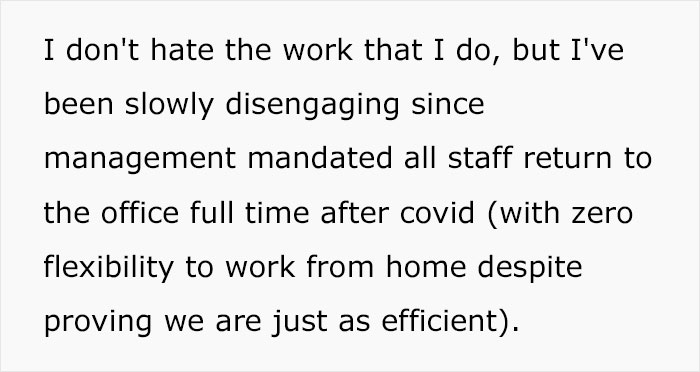
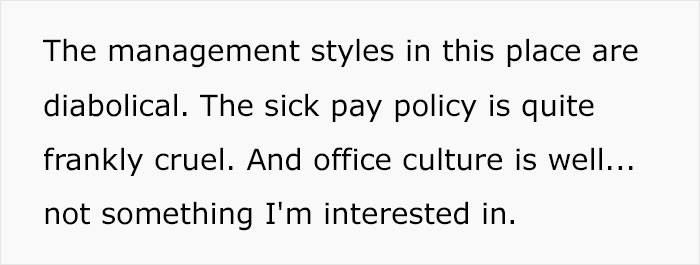
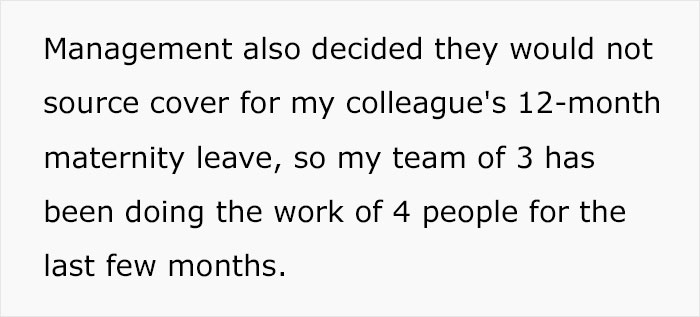
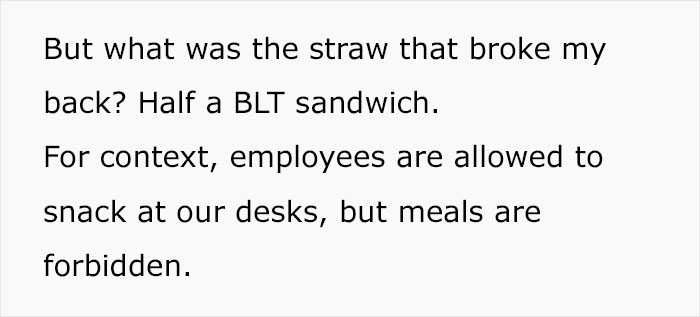











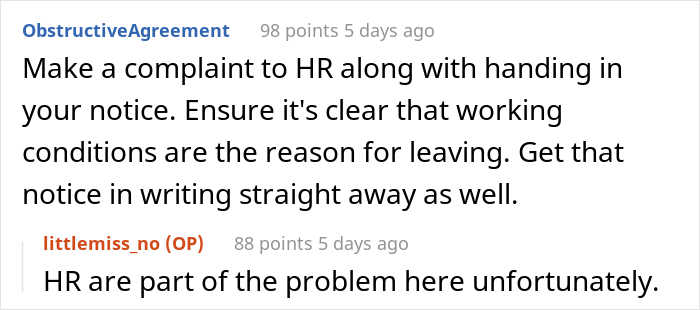


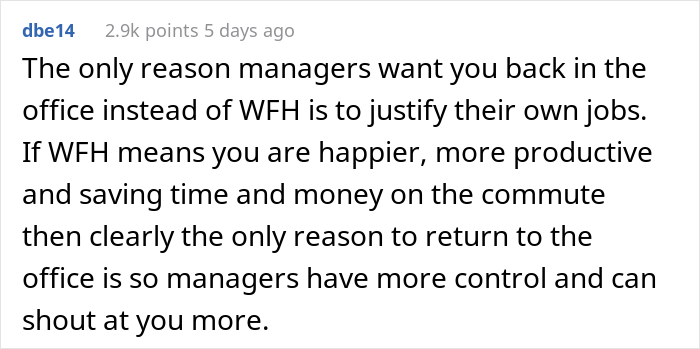







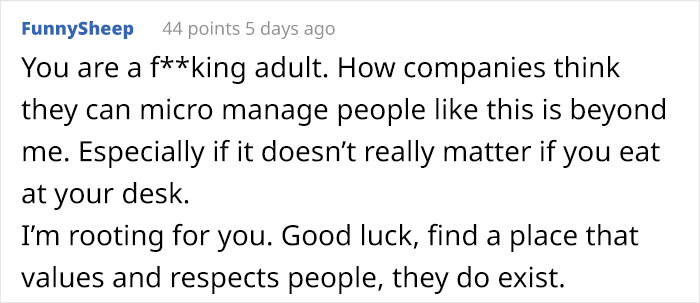




109
42